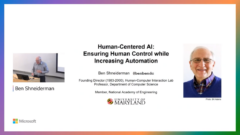Current and Future Application of BCIs
Brain-computer interfaces are used for many applications nowadays. New sensor technology and wireless systems allow an easier and faster usage. Nevertheless, every single step must be done correctly to achieve high accuracies. EEG electrodes, amplifiers, analog-to-digital conversion, wireless transmission, feature extraction, classification and the calibration of the BCI system are of high importance. Dr. Christoph will explain how to do this correctly to be able to use BCIs for stroke, coma and epilepsy patients and to play computer games or to make progress with 1024 EEG channels in neuroscience.
Taille: Microsoft Research Talks
-
Decoding the Human Brain – A Neurosurgeon’s Experience
- Dr. Pascal O. Zinn
-
-
-
-
-
-
Challenges in Evolving a Successful Database Product (SQL Server) to a Cloud Service (SQL Azure)
- Hanuma Kodavalla,
- Phil Bernstein
-
Improving text prediction accuracy using neurophysiology
- Sophia Mehdizadeh
-
Tongue-Gesture Recognition in Head-Mounted Displays
- Tan Gemicioglu
-
DIABLo: a Deep Individual-Agnostic Binaural Localizer
- Shoken Kaneko
-
-
-
-
Audio-based Toxic Language Detection
- Midia Yousefi
-
-
From SqueezeNet to SqueezeBERT: Developing Efficient Deep Neural Networks
- Forrest Iandola,
- Sujeeth Bharadwaj
-
Hope Speech and Help Speech: Surfacing Positivity Amidst Hate
- Ashique Khudabukhsh
-
-
-
Towards Mainstream Brain-Computer Interfaces (BCIs)
- Brendan Allison
-
-
-
-
Learning Structured Models for Safe Robot Control
- Subramanian Ramamoorthy
-
























